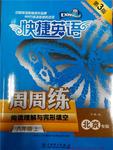题目内容
“Passengers _____ not have their breakfast on the light train”. This rule arouses heated debates in Chongqing.
- A.may
- B.shall
- C.can
- D.should
试题分析:句意:“乘客不得在轻轨上吃早餐。”这个规定在重庆引起了热烈的争论。shall在陈述句表示说话者的允诺、告诫、威胁、命令、规定、必然性等,主要用于第二、三人称。如:
1. You shall have a sweet. 你会吃到一块糖。(表允诺)2. You shall do as you please. 你可以随意行事。(表允诺)3. He shall suffer for this. 他将为此受苦。(威胁)4. Each competitor shall wear a number. 每个参赛者要戴一个号码。(表规定),解题关键词:rule. 故B正确。
考点:考查情态动词的用法。

 快捷英语周周练系列答案
快捷英语周周练系列答案A passenger told an air hostess that he needed a cup of water to take his medicine when the plane just took off. She told him that she would 21 the water in ten minutes.
Thirty minutes later, when the passenger’s ring for 22 sounded, the air hostess realized it at once. She was kept so 23 that she forget to deliver him the 24 . As a result, the passenger was 25 to take his medicine. She hurried over to him 26 a cup of water, but to her surprise he 27 it.
In the following hours on the 28 , each time the air hostess passed by the 29 , she would ask him with a 30 whether he needed help or not. But the passenger 31 paid attention to her words.
When he was going to get 32 the plane, the passenger asked the air hostess to 33 him the passenger’s booklet(意见簿). She was very 34 . She knew that he would write down 35 words, which might result in the loss of her job. 36 with a smile she handed it to him.
Off the plane, she 37 the booklet and cracked a smile, 38 the passenger put it, “On the flight, you asked me whether I needed help or not for twelve times 39 . How can I refuse your twelve sincere smiles?”
That’s 40 ! Who can refuse twelve sincere smiles from a person?
|
1. |
|
|
2. |
|
|
3. |
|
|
4. |
|
|
5. |
|
|
6. |
|
|
7. |
|
|
8. |
|
|
9. |
|
|
10. |
|
|
11. |
|
|
12. |
|
|
13. |
|
|
14. |
|
|
15. |
|
|
16. |
|
|
17. |
|
|
18. |
|
|
19. |
|
|
20. |
|
Twenty years ago I drove a taxi for a living. One night I went to pick up a passenger at 2:30 AM. When I 21 -,I found the building was dark except for a single light in a ground floor 22
I walked to the door and knocked “Just a minute” answered a weak elderly 23
After a long pause the door opened. A small woman in her eighties stood 24 me by her side was a small suitcase. I took the suitcase to the car and then 25to help the woman. She took my arm and we walked 26 toward the car.
She kept thanking me for my kindness. “It’s nothing” I told her. “I just try to 27 my passengers the way I would want my mother treated.” “Oh you’re such a good man.” She said. When we got into the taxi she gave me an address and then asked“Could you drive 28 downtown”
“It’s not the shortest way” I answered quickly.
“Oh I’m 29 ” she said. “I’m on my way to a hospice临终医院. I don’t have any 30 left. The doctor says I don’t have very long.”
I quietly reached over and 31 the meter计价器.
For the next two hours we drove through the city. She 32 me the building where she had once worked the neighborhood where she had lived and the furniture shop that had once been a ballroom where she had gone 33 as a girl.
Sometimes she’d ask me to slow down in front of a 34 building and would sit staring into the darkness saying nothing.
At 35 she suddenly said” I’m tired. Let’s go now.”
We drove in silence to the 36 she had given me. “How much do I 37 you” she asked. “Nothing.” I said. “You have to make a living” she answered. “Oh there are other 38 ” I answered. Almost without thinking I 39 and gave her a hug. She held onto me tightly. Our hug ended with her remark“You gave an old woman a little moment of joy.”
I walked into the 40 morning light. Behind me, a door shut. It was the sound of the closing of a life.
|
1. |
|
|
2. |
|
|
3. |
|
|
4. |
|
|
5. |
|
|
6. |
|
|
7. |
|
|
8. |
|
|
9. |
|
|
10. |
|
|
11. |
|
|
12. |
|
|
13. |
|
|
14. |
|
|
15. |
|
|
16. |
|
|
17. |
|
|
18. |
|
|
19. |
|
|
20. |
|